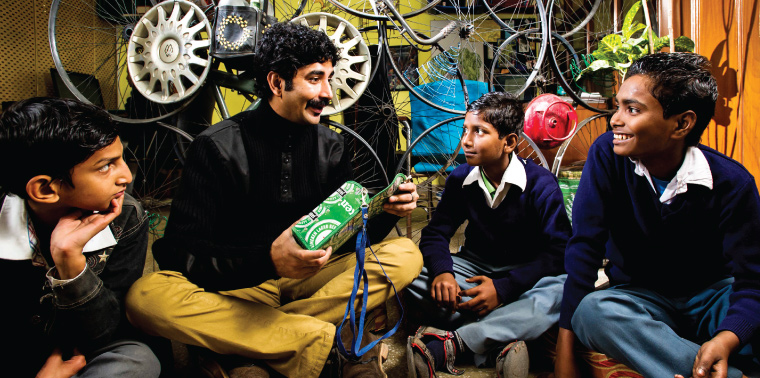March 3, 2014 — Every few months, Vimlendu Jha makes a trip to some of New Delhi’s best private schools, gathers up the students — some of whom come from the richest families in the country — and leads them into the world of waste.
Under the umbrella of Swechha, an environmental nonprofit he founded in 2000, Jha gives these kids an almost cradle-to-grave analysis of their trash. He teaches them what is in their dustbin. He helps them explore where their garbage comes from and where it will go. He shows them the people, usually poor, who dispose of their waste.
Jha charges the private schools a large amount of money for providing this educational experience for their students. He then funnels the money into providing similar programs as well as health services for the children of some of India’s poorest communities. Swechha, a Sanskrit word that means “one’s free will,” offers the same programs at a reduced rate to government-run schools for low-income families and runs a small school for children in a south Delhi slum as well. “[The rich schools] pay for the program and that in turn helps our campaigns on other issues,” Jha says. “It’s a self-sustainable model.”
Swechha’s story began when Jha moved to Delhi in the late 1990s to attend college. He became involved in an anti-dam movement, an anti-nuclear campaign and other activist work. But what really moved him was seeing the Yamuna River flowing through the capital almost black with pollution. “The entire civil society, bureaucracy, ministers — everyone stays in Delhi, and still Delhi has such a pathetic river,” he says. “I had an interest in the environment, but while many of the other environmental issues were larger, they weren’t very visible. This was the most visible issue that disturbed me.” So when he finished college, Jha started a yearlong campaign, “We for Yamuna,” to raise awareness about the need to clean up the Yamuna.
An eco-trip that is part adventure, part fun and part learning, the Yatra teaches kids the importance of natural river systems and the need to rescue and preserve them.After the year was over Jha went off to graduate studies at the Tata Institute of Social Sciences. “When I came back, there was nothing left of this campaign that I’d started,” he explains. He worked in a non-governmental organization for a while, then for an international bank, but found his heart wasn’t in either job. So he started Swechha.
One of Swechha’s most popular offerings is the “Yamuna Yatra,” a 12-day program in which 40 to 50 kids track the river as it flows from its source in the Himalayas through the plains of Agra and Delhi. An eco-trip that is part adventure, part fun and part learning, the Yatra teaches kids the importance of natural river systems and the need to rescue and preserve them. “We look at how the river is so clean when it is with uneducated people in the villages and how it dies as soon as it comes into the plains,” Jha says. “And it’s not mere coincidence that this happens. We explain the reasons why our forests disappear and our rivers dry up and turn black as soon as they come into the areas where Jha says lessons about the environment are best delivered young.people speak English, eat pizza and watch environmental documentaries. Why is it so clean when it’s with people who are illiterate? We try to understand how conservation perhaps is also cultural and not necessarily a virtue that can only be earned through a great private school education.”
Jha says lessons about the environment are best delivered young. And he feels strongly about targeting environmental education to some of the richest kids in the country. “We all know that almost 70 to 80 percent of the leadership of our country in every walk of life, be it media or business or politics, comes from the elite,” he explains. “It’s better that we engage with them at an early stage because otherwise there’s no point making this intervention when they’re in college. This, now, is when the learning happens.”
In the Swechha program Bridge the Gap, which aims to help students become better stewards of the natural environment, Jha asks, “Can human prosperity and nature coexist?”
“Our current education system and our economic paradigm creates a conflict between these two,” Jha says. “We have to look at these issues not as something that’s distant, happening somewhere in somebody else’s life, but right here, happening in mine.” ![]()
Ensia shares solutions-focused stories free of charge through our online magazine and partner media. That means audiences around the world have ready access to stories that can — and do — help them shape a better future. If you value our work, please show your support today.
Yes, I'll support Ensia!
